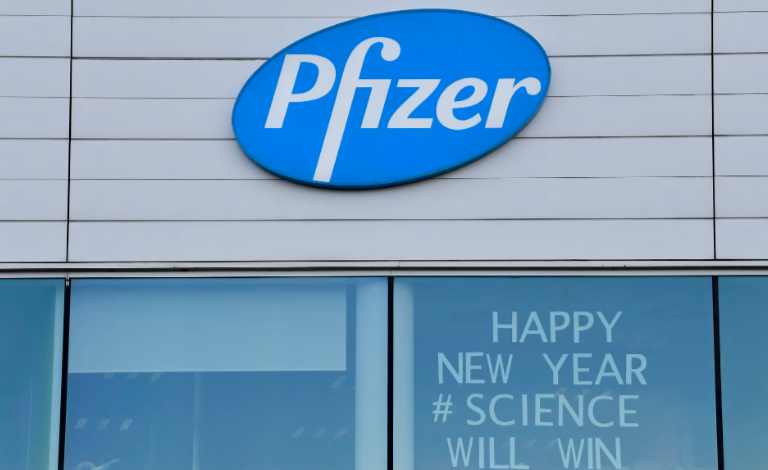Pfizer Inc. reported robust third-quarter results on Tuesday, significantly surpassing analysts’ expectations and prompting an upward revision of its full-year guidance.
This financial boost comes amid strong performance from its COVID-19 antiviral, Paxlovid, and several of its core products.
For the quarter, Pfizer reported a net income of $4.465 billion, translating to earnings of $0.78 per share, reversing a $2.382 billion loss in the same period last year. Excluding one-time items, earnings per share (EPS) were $1.06, well ahead of the anticipated $0.61, according to FactSet. Revenue also saw a substantial increase of 31%, rising to $17.7 billion from $13.5 billion last year, outpacing the $14.9 billion forecast.
The company’s Chief Financial Officer, David Denton, credited the 14% operational growth in non-COVID products for the positive results, adding that the third-quarter gains reflect Pfizer’s “continued focus on commercial execution.”
Pfizer also raised its full-year revenue forecast, now projecting revenue between $61 billion and $64 billion and adjusted EPS between $2.75 and $2.95, up from prior estimates of $59.5 billion to $62.5 billion and $2.45 to $2.65.
The earnings announcement gave Pfizer’s stock a lift, gaining 3.2% in early trading on Tuesday. Pfizer’s shares are now up 0.2% year-to-date, in comparison to the S&P 500’s 22% rise.
Demand for COVID-19 antiviral Paxlovid was a major contributor to the revenue increase, with sales climbing to $2.7 billion in the quarter, a notable jump from $200 million the previous year. Pfizer attributed this surge to higher global COVID-19 infection rates and “strong commercial execution,” with CEO Albert Bourla noting a steady demand for Paxlovid that aligns with recurring COVID waves.
Excluding COVID-related products, revenue from Pfizer’s core portfolio grew by 14%, totaling $13.6 billion. This includes notable gains in the oncology and cardiovascular categories. Sales of Vyndaqel, a heart disease treatment, rose by 63%, driven by strong demand across multiple markets, while Eliquis, a blood thinner, saw a 9% increase in sales, boosted by wider adoption in the US and Europe.
Migraine treatment Nurtec ODT/Vydura also performed well, with a 45% jump in sales. However, some products faced challenges: rheumatoid arthritis treatment Xeljanz saw sales decline by 35% amid reduced prescription volumes, and breast cancer therapy Ibrance reported a 12% drop due to increased competition and lower prices in certain regions.
Pfizer’s 2023 financial performance marks a recovery effort after its stock took a downturn last year, partly due to decreased COVID-19 product demand. To address this, Pfizer implemented a cost-cutting program targeting savings of at least $4 billion by year-end and $5.5 billion overall. The company remains on track to reach these savings, including $1.5 billion from its first phase of manufacturing optimizations.
In line with this strategy, Pfizer recently closed a $43 billion acquisition of Seagen to strengthen its oncology portfolio. The merger added $854 million in revenue from Seagen’s cancer treatments in the third quarter.
With recent developments and improved financial forecasts, investors appear cautiously optimistic. Shares rose in premarket trading as Pfizer raised its profit expectations for the year. J.P. Morgan analyst Chris Schott commented that Paxlovid benefited from strong commercial pricing and an early COVID season, as cases surged in late summer.
Market Watch and Reuters contributed to this report.









